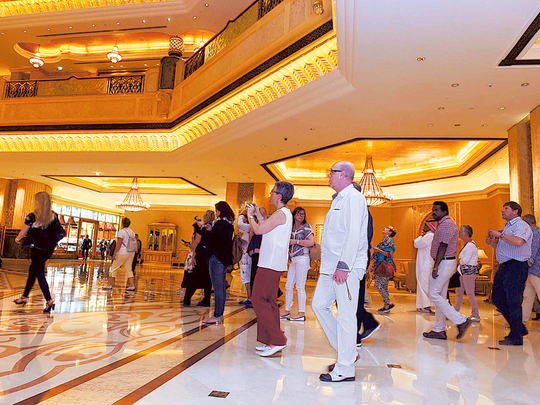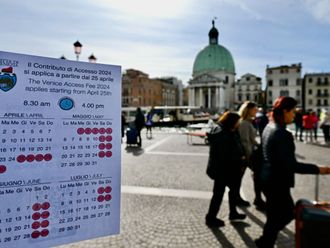
Abu Dhabi: Abu Dhabi’s tourism industry is expected to continue facing challenges this year on the back of global macroeconomic issues such as falling oil prices and currency valuations, which will put pressure on tourist spending.
According to Abu Dhabi’s Tourism and Culture Authority (TCA), global political instability will also mean travellers are increasingly concerned about safety.
“We expect any continuance of the globe’s economic issues to continue to impact the industry this year, meaning more people will have less disposable income to spend on travel.
The challenges the globe faces contributed to a drop off in the average length of stay for our guests, with a three per cent slide in these numbers for the year-to-November [2015],” The TCA said.
In an email interview, the Authority told Gulf News that with length of stay being a “key indicator of the destination’s appeal,” TCA will be working harder this year to combat challenges in the global economic downturn.
Depreciating rouble
Also among challenges facing the emirate’s hospitality sector is the depreciating rouble — an issue that is exacerbated when compared to the stronger dollar, which the UAE dirham is pegged to.
The Russian market has long accounted for a large number of visitors to Abu Dhabi and Dubai.
“The fall in the rouble has certainly had an impact on traffic from Russia. Indeed, as our guest numbers and guest nights have increased in 2015, Russia is one of the only two countries to register a fall in numbers.
In the period until November (2015), guest arrivals from Russia fell by 17 per cent to a total of 27,254 — the largest drop in numbers from our top 25 overseas markets. Guest nights from Russia also fell by 32 per cent, so the rouble and its problems have certainly impacted the opportunities and desire for Russians to travel here,” the TCA said.
The other country to register a drop in guest arrivals was Kuwait, with a nine per cent drop.
To counter the impact of the drop from Russia, the TCA is looking to boost arrivals from existing guest markets as well as tapping into new markets.
In 2016, the Authority said it will focus on the UK, China, India, Germany, Australia, and the GCC — already large source markets. It is also looking at the untapped Moroccan market, Scotland, Hong Kong, and Brisbane — all of which Etihad Airways has recently launched new routes to.
2015 performance
In mid-December, TCA said it was expecting to meet its stretch target of 4.1 million guest arrivals to Abu Dhabi by the end of 2015. Prompted by the increase in visitors in 2014, the TCA had raised its guest targets for 2015 from an earlier figure of 3.5 million guests to 3.9 million, with 4.1 million being the stretch target.
As of November 2015, a total of 3.7 million guests checked into the emirate’s hotels. The Authority is expected to disclose the 2015 performance figures in the next couple of weeks.
“Despite the difficulties [experienced by] the world economy throughout 2015, with the impact still being felt as 2016 begins, the tourism industry in Abu Dhabi has performed well, as indicated by hotel occupancy numbers, which are overwhelmingly in positive territory.
The emirate’s 167 hotel establishments recorded a six per cent increase in total revenue for the period from January to November, compared with the same period in 2014,” TCA said.
Hotel revenues totalled Dh5.99 billion in the first 11 months of 2015 — up six per cent from the Dh5.64 billion recorded in the same period in 2014.
This year, TCA is looking at leveraging developments such as the new cruise terminal at Zayed Port, which is set to boost cruise tourism in Abu Dhabi, as well as leverage archaeological sites in Al Ain.
“Al Ain and the Western Region continue to be a key component of our overall tourism programme … The archaeological sites and ancient civilisations of Al Ain are Unesco-inscribed world heritage sites and have been since 2011. They are of incredible value as a regional tourism differentiator.
The opportunity to develop cultural tourism is at the heart of our promotional push in line with our commitment to protect, conserve, maintain, and celebrate Abu Dhabi’s heritage,” the TCA said.












